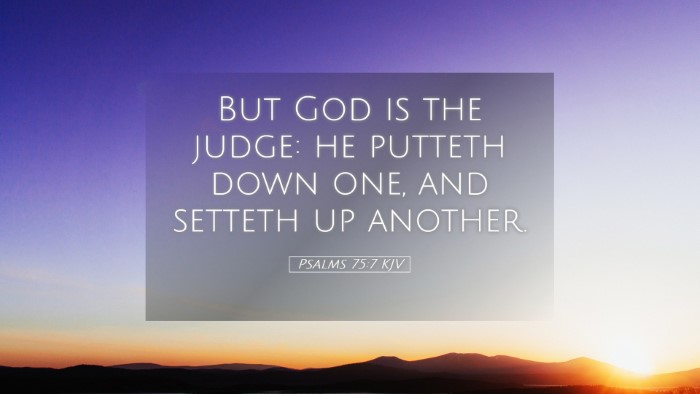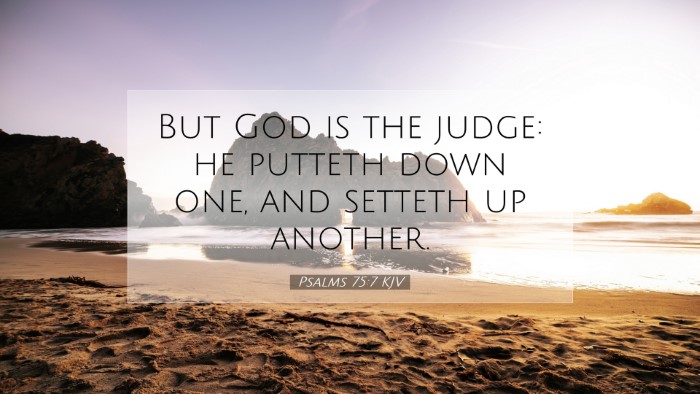Psalms 75:7 - Commentary and Insights
Bible Verse: "But God is the judge: he putteth down one, and setteth up another."
This verse encapsulates a profound theological truth about the sovereignty of God over human affairs. It speaks to how divine authority shapes the destinies of individuals and nations alike. Below, we explore the insights from respected public domain commentaries to provide a deeper understanding of this significant passage.
Contextual Background
The Book of Psalms is a collection of hymns and prayers that express the full range of human emotion in relation to God. Psalm 75 is classified as a Psalm of Asaph and is reflective of God's justice and righteousness.
God as the Judge
Albert Barnes emphasizes that the psalmist directly declares God as the judge of the earth. This assertion is foundational, as it acknowledges that all authority ultimately derives from God. The judgment of God is righteous, equitable, and impartial, which instills hope and fear in equal measure. God's role as the judge also implies His control over the rise and fall of leaders and nations.
The Implications of Divine Judgment
Barnes notes that recognizing God as the ultimate authority should result in a humble submission to His will. Believers are reminded that human systems of justice and governance are underpinned by divine oversight. In times of perceived injustice, this assurance provides comfort, knowing that human actions will be judged fairly by the Almighty.
Divine Authority Over Human Affairs
Matthew Henry highlights the powerful imagery in the verse, explaining it as a statement of divine sovereignty. He writes that God has the prerogative to elevate individuals to prominence and to humiliate others. This theme of divine intervention in the affairs of humanity is echoed throughout Scripture, reinforcing the idea that God operates in the historical narrative.
The Rise and Fall of Leaders
Henry elaborates on the paradox of power dynamics, noting that God can elevate the humble and abase the proud. This is vividly illustrated in several biblical narratives, such as the ascension of David and the downfall of Saul. It serves as a reminder that no matter how powerful one may appear, ultimate authority rests with the Creator.
Theological Reflection on Human Agency
Adam Clarke offers a nuanced view by discussing the interaction between divine sovereignty and human free will. He argues that while God establishes nations and leadership, human agency plays a role within the divine plan. Clarke suggests that God’s setting up or putting down is both an act of divine judgment and a response to human behavior, highlighting the relational aspect of faith and works.
The Role of Righteousness
Clarke further notes that the moral condition of a society influences its leadership. A faithful and righteous people are likely to see leaders arise who reflect those values. Conversely, a wicked society may face judgment in the form of corrupt leaders. This view encourages believers to pursue righteousness, emphasizing that communal faithfulness can result in favorable outcomes under God’s sovereign rule.
Applications for Believers
This verse presents several applications for pastors, theologians, and students of the Bible:
- Trust in God's Sovereignty: Believers are encouraged to rest in the knowledge that God is in control, even during tumultuous times.
- Live Righteously: The understanding that God judges nations and leaders should inspire individuals and communities to pursue righteousness.
- Engagement in Society: Understanding the relationship between divine authority and human agency prompts a call to action, encouraging Christians to be agents of change in their communities.
- Prayer for Leaders: Recognizing that God appoints leaders should lead to fervent prayer for those in positions of power.
Conclusion
Psalms 75:7 serves as a profound reminder of God’s ultimate authority as the judge over the earth. The insights from Matthew Henry, Albert Barnes, and Adam Clarke provide a rich tapestry of understanding that positions this verse at the core of biblical theology regarding divine sovereignty. For pastors, students, and theologians, this passage symbolizes hope and calls for both reflection and action in the quest for a just society rooted in the principles of God's righteousness.


